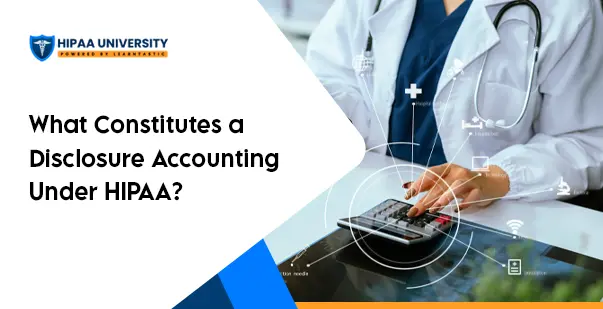What Constitutes a Disclosure Accounting Under HIPAA?

September 2, 2024
Have you ever stopped to ask yourself who’s seen your personal medical details—or why? Under HIPAA, you have a legal right to know. That’s the whole idea behind disclosure accounting. It’s a tracking system that records when, why, and by whom your health information is accessed without your direct say-so.
Whether your data is shared during a public health investigation, a legal case, or even for research, HIPAA requires organizations to log those disclosures. This ensures transparency, builds patient trust, and keeps healthcare providers accountable.
In 2023, there were 725 healthcare data breaches, impacting over 133 million individual records. That’s not just a statistic, it’s a wake-up call. Knowing who has access to your health data matters more than ever. This article breaks down what HIPAA disclosure accounting involves, when it’s necessary, and what healthcare organizations need to do to stay compliant.
Understanding Disclosure Accounting
Disclosure accounting is exactly what it sounds like: an official record of when protected health information (PHI) is shared in ways that fall outside routine treatment or patient-authorized use. Under the Health Insurance Portability and Accountability Act (HIPAA), covered entities—like hospitals, insurance providers, and clinics—must track these instances to give patients a clear view of how their information is being used.
If a patient wants to know who accessed their records and why, they can request what’s called an “accounting of disclosures.” This report includes the details of those non-standard data disclosures, adding a layer of visibility that’s central to both patient rights and HIPAA compliance.
Why Is Disclosure Accounting So Important?
When healthcare organizations track who’s accessed your health records, they’re not just following a rule, they’re creating a culture of trust. And that trust matters. Back in 2018, a major breach exposed the health data of nearly 79 million people. Events like that reinforce why this kind of documentation exists in the first place.
Let’s look at a few reasons why disclosure accounting plays such a crucial role:
- It Builds Transparency
Patients have the right to know who has seen their private health details. Logging disclosures creates a paper trail that ensures everyone involved is being open about how information is handled.
- It Gives Patients Control
With access to their disclosure history, patients are better equipped to make informed choices about their care—and about who should or shouldn’t see their information.
- It Encourages Accountability
When employees know that their actions are being recorded, they’re far more likely to handle data with care. And if something does go wrong, having a disclosure log makes it easier to pinpoint what happened.
- It Keeps You Compliant
HIPAA compliance isn’t optional. It’s the law. Disclosure accounting helps covered entities stay on the right side of that law, avoiding everything from hefty fines to reputational damage.
Read More: What Is The Purpose of HIPAA in 2025?
When Is Disclosure Accounting Required?
Not every piece of data that moves within a hospital or clinic needs to be logged, but some disclosures—especially those done without direct patient authorization—must be tracked carefully. Here are the major scenarios that trigger HIPAA’s disclosure accounting requirement:
- Public Health Reporting
Let’s say a patient’s information is used to report a contagious disease or track vaccine reactions. Those types of public health uses must be documented. - Law Enforcement
If a provider is legally required to share health information with police or investigators—whether through a subpoena, warrant, or official request—it must go into the disclosure log. - Legal Proceedings
Any disclosure that’s tied to a court case, administrative hearing, or similar legal process has to be tracked. This includes anything shared in response to subpoenas or court orders. - Research Without Authorization
Sometimes, PHI is used for research purposes without asking the patient directly—for instance, in large-scale studies that use de-identified data. If the use doesn’t involve treatment, and no authorization is given, it must be logged. - Military or National Security Use
Disclosures made to support military functions or national security interests also fall under HIPAA’s required accounting umbrella. Transparency still applies—even when it comes to federal matters.
When Is Disclosure Accounting Not Required?
HIPAA doesn’t demand a disclosure log for every internal use of data. In fact, several day-to-day operations are exempt. Here are the most common exceptions:
- For Treatment
If doctors, nurses, or specialists are sharing information with one another to treat a patient, no log is needed. This is considered standard practice. - For Payment
When your health information is used to process insurance claims, verify coverage, or send bills—those activities don’t require disclosure accounting.
- For Healthcare Operations
If the information is used for things like quality improvement reviews, internal audits, or training staff, it doesn’t need to be logged. - When the Patient Gives Permission
Once a patient signs a clear authorization form, any resulting disclosures are exempt from tracking.
- For Limited Data Sets
When PHI is stripped of direct identifiers and used for public health, operations, or research, disclosure accounting isn’t required.
These exclusions keep the healthcare system running efficiently without compromising security.
How to Maintain a Disclosure Accounting
When a disclosure does require logging, the documentation must be detailed. Here’s what needs to be included:
- Date of Disclosure – When the patient’s information was shared
- Recipient – Who received the information (name and organization)
- Description of the Information – A brief summary of what was shared
- Purpose of Disclosure – Why the information was disclosed
- Any Patient Instructions – Notes about any restrictions the patient requested
These records must be kept for at least six years. That’s right—six full years from the date of each disclosure. Whether stored digitally or physically, the information must be secure and accessible in case the patient requests it.
Patient Rights: Requesting a Disclosure Log
Under HIPAA, patients have the right to request a copy of their disclosure history. Here’s how that process works:
- Providers must respond to the request within 60 days
- One disclosure report is free each year
- Additional requests can come with a reasonable fee—as long as the patient is told in advance
This right empowers patients to better understand how their data is used, giving them peace of mind and a greater sense of control.
Read More: HIPAA Retention Requirements
Challenges Healthcare Organizations Face
Keeping up with disclosure accounting isn’t easy—especially in larger healthcare systems. There are quite a few hurdles to consider:
- It Gets Complicated
With hundreds or thousands of employees and multiple departments handling patient data, things can get messy fast. Disclosures can happen in unexpected places, making tracking difficult. - Tech Limitations
Some organizations still use outdated systems—or no system at all—for managing disclosures. Without automation, staff are left to log entries manually, increasing the chances of errors.
- Lack of Training
If your staff isn’t trained on which disclosures need to be logged and how, you’re putting your entire organization at risk. HIPAA training must be consistent and thorough.
- Compliance Demands
Staying on top of HIPAA means constant monitoring, policy updates, and internal audits. It takes time, resources, and leadership buy-in.
Practical Solutions: How to Stay on Top of It
Healthcare organizations can reduce risks and streamline disclosure accounting by investing in the right strategies and systems and also by taking the hipaa course for healthcare:
- Implement Robust Systems
Use Electronic Health Record (EHR) platforms with disclosure tracking capabilities that automatically log key information and generate accounting reports. - Conduct Regular Audits
Periodic reviews help identify gaps in tracking and documentation. Audits are also useful for preparing for official HIPAA inspections or responding to patient inquiries. - Provide Ongoing Staff Training
Regular HIPAA compliance training ensures employees understand how to track disclosures correctly and stay up to date with current regulations. - Establish Clear Internal Policies
Create step-by-step procedures for identifying and recording disclosures. Make sure policies are shared with all team members and updated frequently.
The Role of Technology in Disclosure Accounting
Technology plays a vital role in simplifying disclosure accounting under HIPAA. Electronic Health Record (EHR) systems can automate much of the process, reducing manual errors and increasing consistency.
Here’s how EHR systems help:
- Automation
Automatically logs who accessed the PHI, when, and why—ensuring nothing is missed. - Efficiency
Makes it easy to generate reports for patients or audits in seconds, reducing admin time. - Centralized Data
Keeps all disclosure information in one place, which improves access, security, and reporting accuracy. - Compliance Support
Many EHR platforms include prompts, templates, and audit trails that support ongoing HIPAA compliance.
The Future of Disclosure Accounting
As healthcare continues to evolve, so will the systems and policies around disclosure accounting. Here’s what’s ahead:
- Smarter EHR Systems
Future platforms may offer even deeper automation and real-time audit trails for better oversight. - Blockchain Technology
Could create tamper-proof records of data disclosures, offering greater transparency and trust. - Patient-Centered Tools
We may see more apps and portals where patients can directly view their disclosure history and manage data-sharing preferences. - Tighter Regulations
As public concern over data privacy grows, HIPAA rules may expand to require even more detailed documentation and proactive tracking.
Final Thoughts
Disclosure accounting is a cornerstone of HIPAA compliance training, helping ensure that protected health information is used responsibly, ethically, and transparently. When patients can see who accessed their data and why, it fosters trust, accountability, and better decision-making.
For healthcare providers, maintaining accurate disclosure logs isn’t just a legal requirement—it’s a patient-centered responsibility.





